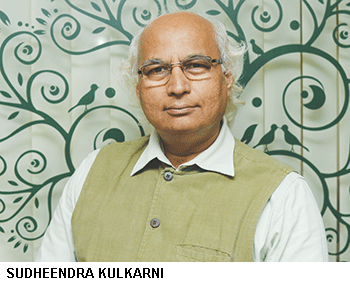 Chandrabhan Prasad is a well-known Dalit public intellectual, slayer of orthodoxy and an individual unafraid to challenge mainstream thinking in the Dalit movement on capitalism, globalisation and liberalisation. After having played a mentor’s role in the creation of the Dalit Indian Chamber of Commerce and Industry (DICCI, estb.2005), he now publishes an attractive new monthly magazine titled Dalit Enterprise. It features successful first-generation businessmen from the Scheduled Castes, many of them photographed with their super-expensive cars. (Yes, today not all Dalits are poor or downtrodden, much less ‘untouchable’.) The magazine’s motto makes his ambition clear: to create ‘a 100 Dalit billionaires’. He believes that Dalits should be job givers, not mere job seekers. May his dreams come true.
Chandrabhan Prasad is a well-known Dalit public intellectual, slayer of orthodoxy and an individual unafraid to challenge mainstream thinking in the Dalit movement on capitalism, globalisation and liberalisation. After having played a mentor’s role in the creation of the Dalit Indian Chamber of Commerce and Industry (DICCI, estb.2005), he now publishes an attractive new monthly magazine titled Dalit Enterprise. It features successful first-generation businessmen from the Scheduled Castes, many of them photographed with their super-expensive cars. (Yes, today not all Dalits are poor or downtrodden, much less ‘untouchable’.) The magazine’s motto makes his ambition clear: to create ‘a 100 Dalit billionaires’. He believes that Dalits should be job givers, not mere job seekers. May his dreams come true.
In a recent interview with him in Delhi, I asked Prasad, “What are your plans for the future?” Pat came the answer: “I would like Dalit children to excel in physics, mathematics and English.” English, I could understand, because Prasad has been a longtime votary of English medium education for Dalits. He even erected a temple for the ‘goddess’ of English in Uttar Pradesh! He regards the English language, together with capitalism, as a combination which will liberate the new generation of Dalits. But why physics and mathematics? Prasad, a perspicacious spotter of new trends in society and science, explains that the next-gen enterprises in India and around the world will be driven by revolutionary new digital technologies.
Although I didn’t discuss it with him, the question Prasad’s interview planted in my mind is important. True, there should be lakhs of successful Dalit entrepreneurs, big, medium and small, all confidently competing in the competitive domestic and global market. India should also produce world-class Dalit scientists, inventors and innovators for the emerging digital age. But how can Dalit or non-Dalit students outperform the global best if their teachers are recruited, and also promoted, on the basis of caste quotas, disregarding quality, competence, commitment and accountability?
Questioning faculty caste quotas in publicly funded schools, colleges and universities has become a great hazard for social activists, policy makers and politicians. (I am strongly opposed to faculty reservations, whereas I support reservations for SC-ST students with some caveats). No politician questions faculty quotas because of vote bank considerations, although, in private conversations, they, including some enlightened SC-ST-OBC leaders, are critical of the many wrongs perpetrated in the cause of reservations for Dalits. Similarly, very few academics and public intellectuals publicly express their frank views on this subject for fear of being denounced as anti-Dalit.
But the time has come to forthrightly discuss this taboo subject, and bring it to the centre-stage of a national debate and policy review. This must be done, first and foremost, for the benefit of Dalit students themselves. Don’t they — and non-Dalit students, as well — deserve the best teachers capable of developing their all-round personality, especially at a time when government jobs are shrinking and competition is rising for employment and entrepreneurship opportunities in the private sector? Why should tens of millions of Dalit students continue to remain disempowered for the sake of ‘empowerment’ of a far smaller number of non-meritorious teachers from quota categories? Let there be a national survey seeking the views of Dalit students: Would they like to be taught physics, mathematics, English, entrepreneurship and other subjects by teachers who are recruited on the basis of competence or caste? The outcome of the survey will surely deliver a slap on the face of those who maintain that caste quotas for recruitment of teachers should not only continue in government-funded education institutions, but also be extended to private sector schools, colleges and universities.
To my arguments faculty quota proponents have a ready retort: “Why do you presume that only non-Dalit teachers are competent?” This question is disingenuous. Merit is not a monopoly of any caste. It is — and has to be — caste-blind. If, as Prasad rightly desires, Dalit students should master quantum physics, new technologies, English literature and business management, they need the best teachers in these subjects, irrespective of their caste. Indeed, SC-ST students, and poor students from rural backgrounds, need the best teachers more than their counterparts in the upper castes and classes. Hence, the quota criterion in teacher recruitment and promotion is manifestly anti-Dalit. In effect it is inimical to genuine, large-scale Dalit empowerment.
For much too long, the debate on caste quotas has been suffocated by political correctness on one side and fear on the other. This does no credit to a free and democratic nation. For the sake of a prosperous and dignified future for Dalit children and youth, and for India’s equitable development free of caste-based disabilities, academia and the intelligentsia must press for abolition of reservations in teachers’ appointment and promotion.
(Sudheendra Kulkarni was an aide of former prime minister Atal Bihari Vajpayee (1999-2004) and is currently the Mumbai-based founder of the Forum for South Asia)